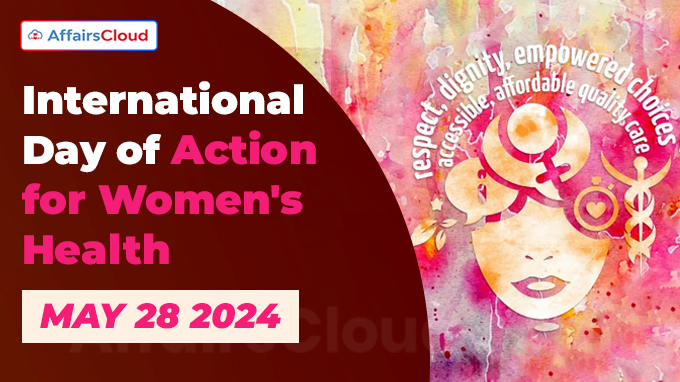 International Day of Action for Women’s Health (also known as International Women’s Health Day) is annually observed across the globe on 28 May to ensure women’s health and well-being worldwide, particularly in terms of their Sexual and Reproductive Health and Rights (SRHR).
International Day of Action for Women’s Health (also known as International Women’s Health Day) is annually observed across the globe on 28 May to ensure women’s health and well-being worldwide, particularly in terms of their Sexual and Reproductive Health and Rights (SRHR).
- This Day calls for organizations and activists globally to mobilise Sexual and Reproductive Health, Rights, and Justice (SRHRJ) for all through inclusive, accessible, and available SRH information and services.
The 2024 observance focussed on “Mobilising in Critical Times of Threats and Opportunities”.
Note: The 2024 observance emphasised empowering women, girls, and gender-diverse people to make decisions independently, free from coercion and discrimination.
Background:
i.In 1987, during the International Women’s Health Meeting in Costa Rica, the Latin American and Caribbean Women’s Health Network (LACWHN) proposed to celebrate May 28 annually as the International Day of Action for Women’s Health.
ii.Collaborative Efforts:
- As the leading regional network, LACWHN promoted and coordinated regional activities.
- The Women’s Global Network for Reproductive Rights (WGNRR) was tasked with leading the May 28 global campaign efforts.
iii.Since then, women’s health advocates and their communities worldwide have commemorated 28 May as the International Day of Action for Women’s Health.
Sexual and Reproductive Health Rights (SRHR):
i.It is a fundamental right, crucial for the highest attainable standard of physical and mental health.
ii.The United Nations (UN) Sustainable Development Goals (SDGs) explicitly recognised SRHR as essential to health, gender equality, and economic and social development.
iii.It is critical for achieving Universal Health Coverage (UHC) and contributing to gender equality and empowerment.
iv.Women’s sexual and reproductive health is related to multiple human rights, including:
- the right to life; the right to be free from torture; the right to health; the right to privacy; the right to education; and the prohibition of discrimination.
Efforts:
The SRHR-UHC Learning by Sharing Portal (LSP) was launched in 2022, to support countries to prioritize and expand coverage of SRHR services.
- It was jointly launched by the World Health Organization (WHO) and the United Nations Population Fund (UNFPA).
Challenges and Inequities:
i.Safe abortion access is often limited to the privileged.
ii.Discrimination against diverse Sexual Orientation, Gender Expression, and Identities (SOGIE).
- Trans and gender non-conforming individuals face life-threatening barriers to healthcare.
iii.Stigma, urban-rural divides, and technology gaps hinder healthcare access.
Global Crises Impact:
Conflict Zones: Women and gender-diverse people in Ukraine, Palestine, Sudan, Yemen, Iran, and Myanmar face severe healthcare challenges.
Natural Disasters: Earthquakes in Turkey and Syria left many without essential reproductive healthcare.
Some Global Progress:
France: First country to constitutionally recognise abortion rights.
Mexico: Decriminalized abortion on a federal level in September 2023.
Nepal: Approved same-sex marriages in November 2023.
Japan: Courts ruled against denying same-sex marriage as unconstitutional.
About Women’s Global Network for Reproductive Rights (WGNRR):
Executive Director– Debanjana Choudhuri
Headquarters– Manila, Philippines
Established in 1984




